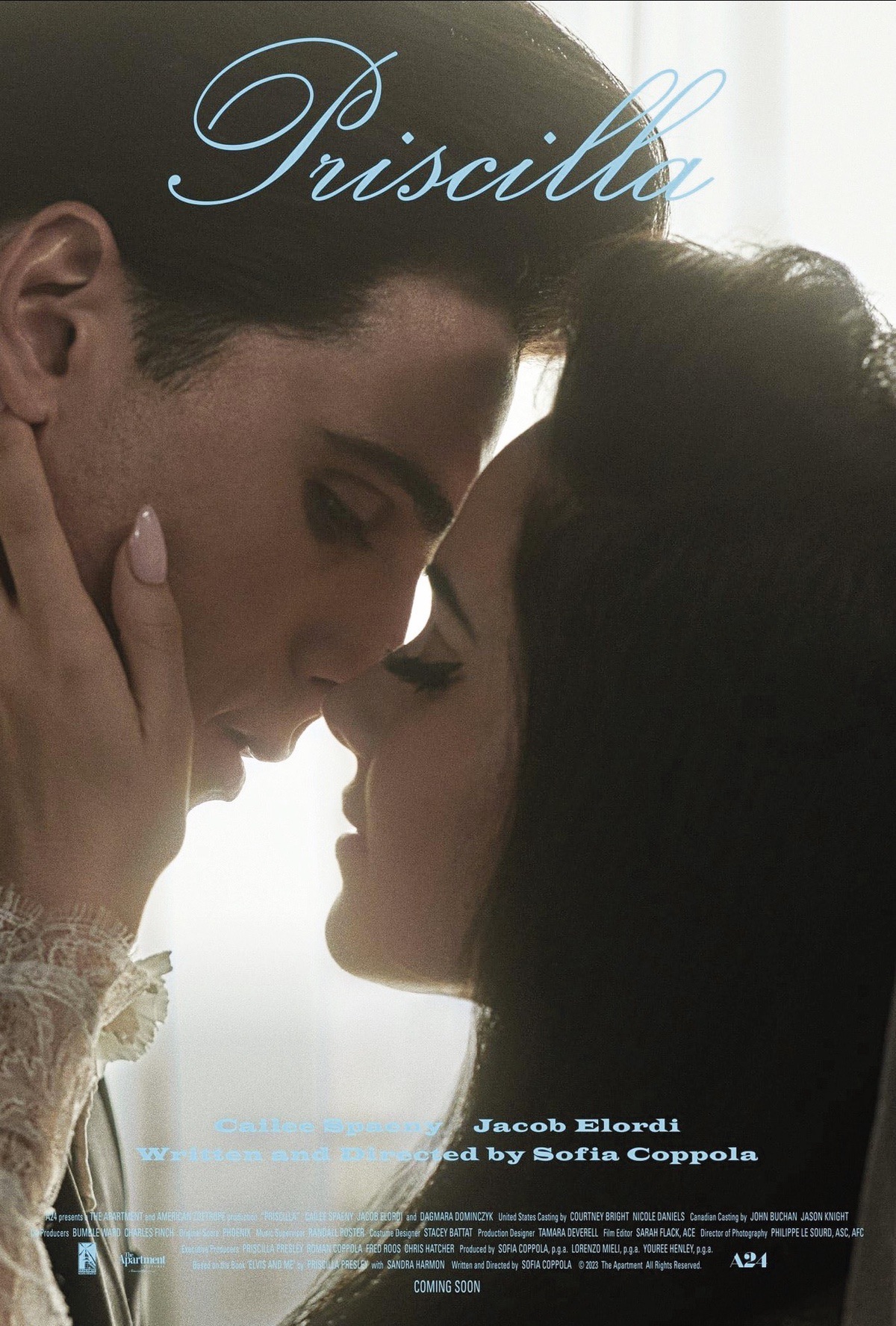Some people may be really mad about what I am about to write, put off by what is considered sacred.

But as we well know, even our idols are human; nobody’s perfect. In theaters, Priscilla comes to us from writer/director Sophia Coppola, just a little over a year after Baz Luhrmann’s rapturous bedazzled send-up to the King. One major issue I did have was the way Baz’s film sidestepped most of the courtship and eventual marriage to Priscilla Beaulieu. She would pop up in scenes with barely a mention to who she was later, only raven bouffant and feathered eyelashes as signifiers.
Sophia must have felt the same way, because this film rectifies this from the very start. We first meet the young Beaulieu studying in a diner on an army base in West Germany, when she is approached to attend a party to meet the Man himself. It almost comes off too quick, however this is from the memoir Elvis and Me. What transpires is how she was courted; this is her story, her perspective.
Coppola takes care to show us Priscilla’s family and the dynamics therein. Her father, much like how we should have been watching Elvis, should have asked why this fourteen-year-old girl? The explanation never comes; serendipity perhaps. A certain piece of dialogue in which Elvis speaks poorly of John Derek elicited a chuckle. That must have been intentional. Caillee Spaeny breaks through in her first starring role, giving shape with every single emotion. Not playing to the cheap seats, her understated approach expresses more than any added flair could muster. Her grand isolation within Tennessee opulence makes her a songbird without a microphone, as muted as the beige carpet. Jacob Elordi creates, not Elvis the public persona, but Elvis the private man. There is a subtle warmth that was lacking in Austin Butler’s portrayal, some tangible, lived-in feeling. He neither makes him purely a saint nor a sinner.
Iconography is lifted to give a time and place; a black leather outfit here, a white sequined jumpsuit there. Colonel Tom is only mentioned when Elvis is on the phone with him. A visual sequence is almost copied verbatim, albeit muted and drained of any grandeur. This film is clearly the Anti-Luhrmann.
Cinematographer Phillippe Le Sourd stonewashes each frame with natural lighting, as if we are intruding into Priscilla’s own memory. He has previously worked with Coppola on her version of The Beguiled, a film I thought wasn’t as good even though it was better than the Clint Eastwood original. Here Sophia is more in her element. With a soundtrack that both evokes and contrasts the time period, Priscilla might just rankle some who wanted to still put Presley on a pedestal. Here both of them are given the dignity afforded to those out of the public eye: true pathos.
From one public life to private ones, the Showtime miniseries Fellow Travelers delves into those working in Washington during the McCarthy Era. Hawkins, a State department official, is played with effortless charm by Matt Bomer. He has a chance encounter at a political soirée with newcomer Timothy. This eventually leads to Tim’s first job working under Roy Cohn, but also a clandestine affair with Hawk. As we all know, this will not bode well going forward. The Red Scare lead to the Lavender Scare, a bruise we as a nation are still recovering from.
Only two episodes in, both Bomer and Jonathan Bailey’s Tim have amazing chemistry together. Each detail of the time period feels lifted out of history and brought to fresh new life, not that what is going on now in the headlines feels any different. A fair warning; even at this point, scenes have gotten rather graphic if you know what I mean. And I don’t mean just heavy nose prosthetic on Chris Bauer. Regardless which you choose (or choose both), it is an embarrassment of riches and all are highly recommended.




